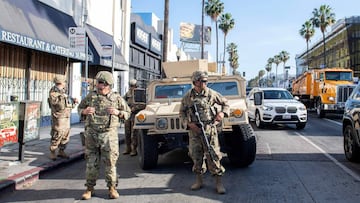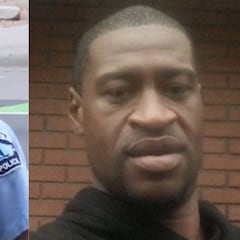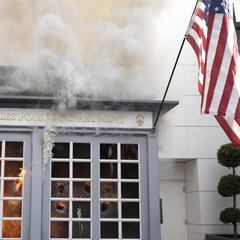National Guard arrives in Los Angeles to control protestors and stop looters
On Saturday, Los Angeles Mayor Eric Garcetti imposed a citywide curfew from 20:00 to 05:30 due to the violent protests over the death of George Floyd.

On Friday night the protests over the death of George Floyd, a black man who died after a white police officer knelt on his neck for nearly nine minutes, reached Downtown Los Angeles. As the protests continued they began to turn violent, with people burning cars, looting businesses and being aggressive towards the police who were trying to control the situation.
Protestors were back in the streets on Saturday leading to Los Angeles Mayor Eric Garcetti imposing a citywide curfew from 20:00 local time until 05:00 in a bid to prevent the looting of businesses and violent protesting on the streets.
Several police cars were torched on Saturday afternoon as protestors challenged the authorities. Despite the authorities' pleas for the protests to remain claim, there were more people out on the streets on Saturday, leadign to the Mayor deciding to bring in the National Guard for help. In total, the L.A. police arrested 533 people on Saturday.
The California National Guard is being deployed to Los Angeles overnight to support our local response to maintain peace and safety on the streets of our city.
— MayorOfLA (@MayorOfLA) May 31, 2020
Curfew expected to be extended until Monday
As of Saturday night the National Guard arrived in the city of Los Angeles to help control the chaos following the violent protesting and looting. Armed soldiers were patrolling the streets of Los Angeles early Sunday as the city began the massive clean up after a full day of violence and looting.
LASD now moving further down Melrose. Protesters threw a glass bottle at them and they lit the crowd up bigtime with pepper balls. They all took off down the street and haven’t come back. @FOXLA pic.twitter.com/tDMJX5vgsy
— Bill Melugin (@BillFOXLA) May 31, 2020
The National Guard arrived immediately after the Gov. of California Gavin Newsom declared a state of emergency for all Los Angeles County with police officers injured and stores were looted and vandalized on Saturday.
Related stories
Mayor Eric Garcetti ordered an immediate deployment of the National Guard to maintain peace and safety on the streets of Los Angeles. Garcetti said Saturday he asked Gov. Newsome for 500 to 700 members of the Guard to assist the 10,000 Los Angeles Police Department officers who were trying to control the situation.
The scale of the destruction in Los Angeles was being compared to the 1992 riots, when there was more than $1 billion in property damage. For the past two days many businesses who suffered due to the coronavirus pandemic saw another damaging blow just as they were preparing to get back to business with California entering the second phase of reopening.
- Derek Chauvin charged with murder and manslaughter
- Where does Trump's 'when the looting starts...' quote come from?
- George Floyd autopsy: no sign of strangling
- George Floyd GoFundMe page raises nearly $5 million
- Curfew in Minnesota: cities affected, schedules and restrictions
- How a suspected counterfeit $20 bill led to protests across the US

